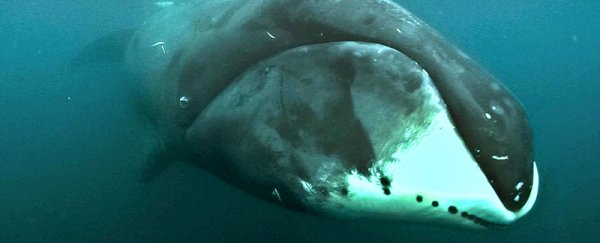The bowhead whale, Balaena mysticetus, lives for more than 200 years in the wild, and now scientists have mapped its complete genome in an attempt to find out why. And, perhaps, how we can get humans to do the same.
The research, led by a team of scientists from the University of Liverpool in the UK, suggests that alterations in several key genes may help the bowhead whale, which lives in the cold Arctic waters and grows to around 20 metres in length, live to such an old age.
By comparing the species' DNA to that of other mammals, the researchers found that there are some alterations related to cell division, DNA repair, cancer and ageing that need to be investigated further. The full genome has been published in the journal Cell Reports.
"Our understanding of species' differences in longevity is very poor, and thus our findings provide novel candidate genes for future studies," said the paper's lead author João Pedro de Magalhães in a press release.
"My view is that species evolved different 'tricks' to have a longer lifespan, and by discovering the 'tricks' used by the bowhead we may be able to apply those findings to humans in order to fight age-related diseases."
The whales also have 1,000 times more cells than humans, but for some reason this doesn't appear to have caused an increase in cancer risk - whales do, in fact, get cancer just like us, but not as often as scientists would expect - which suggests that they've also evolved a natural mechanism to help suppress cancer more efficiently than other animals.
The team is now planning to breed mice that express some of the more unique bowhead whale genes in the hopes that they can work out exactly what role these genes play in longevity and disease resistance.
They're also hoping to find insight into some of the genes that help whales grow so large compared to other mammals and maintain such a low metabolic rate, as this is the first large whale genome to be sequenced.
Although it's still early days, they already have some evidence that a specific gene called UCP1 may help whales to adapt their metabolism to their large size. The complete bowhead whale genome will now allow them to test this theory further.
If we do find out more about certain genes that increase lifespan, we suppose the big question is - do we really want to live to 200?
Source: EurekAlert
